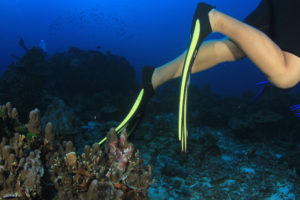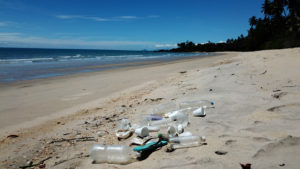Divers know they must be careful not to harm delicate marine ecosystems while they’re underwater. Though scuba can potentially damage the environment, savvy underwater explorers take protective measure to minimize their impact. We’ve all heard the phrase “take only pictures; leave only bubbles,” but going the extra mile can really make a difference when it comes to protecting the environment when you dive. Here are seven easy ways to help the ocean.
Think local when possible
While some lucky divers can walk to their favorite dive site, most of us need to get to our destinations by plane, train or automobile. Reduce your impact by choosing fuel-efficient vehicles and airlines that go above and beyond to reduce environmental harm.
Pack wisely as well. Heavy luggage and equipment causes airlines to use more fuel, so pack lightly. Divers without equipment can rent gear at their destination to avoid adding to the load.
Check your equipment (and buoyancy)

Both faulty diving equipment and operator error can damage delicate reef environments. Fins can damage corals and other undersea plants when divers lack sufficient buoyancy control, so all ocean explorers should receive training on how to properly control their depth level without kicking violently.
Flawed tanks can leak chemicals or even cause explosions. Secure them against rolling around on rocky boat rides, and inspect dive-shop cannisters for scratches and other damage.
Think like a hiker
Recreational hikers learn the rules of the trail and divers can follow similar guidelines. Many hikers keep trails green by picking up at least one piece of garbage during each outing. Think along the same lines when diving, especially given the severe threat plastic poses to the ocean. Bring a mesh bag on your dives or use your BCs pocket to pick up debris along the way.
Do some research
One powerful way divers can help protect the oceans is by tracking changes to their favorite destinations. Organizations such as the U.S. Geological Service measure the area’s average marine temperature, study the proliferation of sea life, and report the introduction of predatory species.
Divers living near their favorite scuba spots can help teach the public about ocean conservation. They can host educational courses for tourist groups and beachgoers and help explain how their behavior on land impacts marine life. They can also volunteer on field trips for schoolchildren to share their knowledge of marine animals and plants.
Help in ocean (or lake) cleanup

Finally, a great way to get involved is by participating in an organized ocean cleanup. Join a Dive Against Debris or ask your local dive shop to host a cleanup. Divers can contact local news media or post on community Facebook pages about the cleanup to drive interest.
Emily Folk works as a sustainability journalist covering topics in renewable energy, conservation and zero waste. You can read more of her work on her blog, Conservation Folks.

